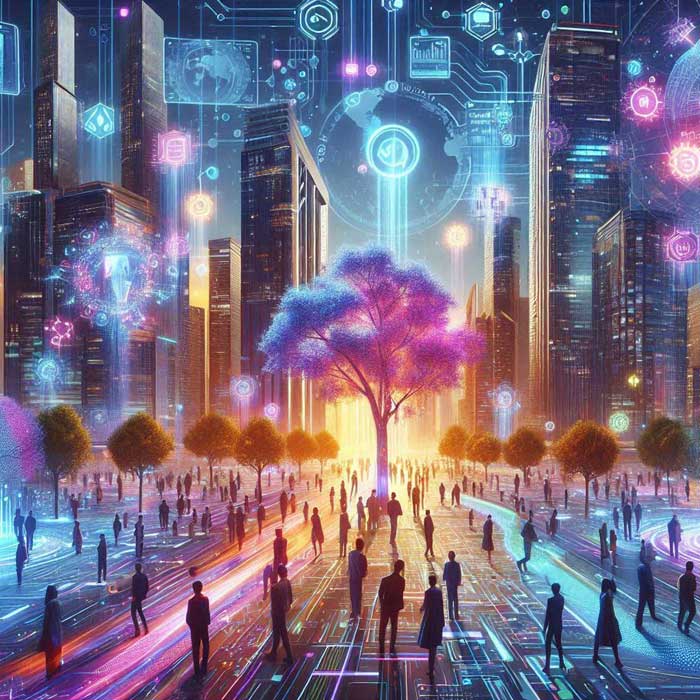From Steam to AI: It’s Time for Sharism
We are undoubtedly living through a historic transformation, unprecedented in scale,that is reshaping every level of society, every sector, and every corner of the world.
We live in an age of constant acceleration. The boundaries between the physical and digital are dissolving, and technology is no longer just a tool—it has become the invisible infrastructure that shapes how we think, work, create, connect, and even dream.
But this transformation is not just technological—it’s anthropological. Its impacts are deep, social, and political. A new paradigm is emerging, one that could rival—or even surpass—the impact of the Industrial Revolution.
Just as steam engines, electricity, and railways radically changed society in the 18th and 19th centuries, today’s algorithms, neural networks, blockchain, AI, cybersecurity, and distributed systems are redefining every aspect of human life.
And like every revolution, this one needs a compass—a shared vision to guide its course.
From Steam to Algorithms: Shared Knowledge Is the New Raw Material
In the Industrial Revolution, machines replaced manual labor. Societies reorganized around factories. Cities grew, economies globalized—but at great cost: rising inequality, alienation, labor exploitation, and environmental destruction.
Today, artificial intelligence and digital platforms are doing the same with human thought. Thinking, writing, and designing are becoming automated. The new “factories” are cloud systems, data centers, and digital platforms. But at what cost, if wealth continues to concentrate in the hands of a few who dominate the algorithmic infrastructure?
The new raw material is no longer coal or steel. It’s information.
The Risks of Ignoring the Value of Sharing
If the digital revolution is guided solely by profit or data control, we risk entering a new, subtler form of alienation:
-
Phygital spaces could become passive entertainment instead of vibrant places of connection.
-
AI could replace human intelligence rather than amplify it collectively.
-
Closed platforms may exploit sharing rather than reward it.
Without a vision like Sharism, sharing turns into surveillance, and participation becomes dependence.
The Challenges Ahead
Much like the Industrial Revolution brought environmental and social challenges, the digital revolution carries significant risks. Sharism can be a guiding light—if we build the right conditions:
-
Protection of digital rights and privacy
-
Prevention of monopolistic tech power
-
Promotion of accessible digital education for all
Work, AI, and the Necessary Transition
AI and automation are radically transforming the world of work. Millions of jobs—both manual and intellectual—are disappearing or being redefined. Without shared strategies, we risk mass unemployment, social polarization, and global instability.
Sharism offers a new path forward:
-
Distributed and collaborative work models, where value emerges from peer interaction, not just productivity
-
Inclusion, ensuring emerging opportunities are accessible and reduce digital divides
-
Shared upskilling, through open learning communities, immersive experiences, and continuous knowledge exchange
-
Collaborative innovation, where co-creation is valued and supported
-
Resilient economic ecosystems, where collective contributors receive recognition, credit, and opportunity
Sharism can help turn a looming crisis into a once-in-a-generation opportunity to reinvent work—and our way of living together.
Toward a New Digital Social Contract
Just as new labor laws once regulated the industrial economy, today we must build a new social contract for the Phygital AI era. Sharism could be its beating heart.
This isn’t utopia—it’s a real, tangible opportunity: to make innovation not just fast, but fair. Not just profitable, but inclusive.
Sharism reshapes how we understand power, value, and participation. If we embrace it, we can turn this revolution into a collective leap forward.
From Industrial Production to Immersive Co-Creation
During the Industrial Revolution, society moved from craftsmanship to mass production. Today, we are shifting again: from production to co-creation, from passive consumption to immersive interaction.
We’re not just “selling products” anymore—we’re creating shared experiences where value is born from collaboration.
People are no longer passive consumers—they are active participants, creators, witnesses, and co-developers. And the most powerful form of this new reality is the one we share.
Sharism: A Social Philosophy for the Phygital AI Age
Sharism, originally coined by Isaac Mao during the rise of social media, now takes on renewed relevance.
In a world where every object, space, and piece of content can be interactive and data-driven, sharing is no longer just distribution—it’s value creation. Economic, social, cultural, and emotional.
In the Phygital AI context, Sharism means:
-
Interaction-based economies: The more people participate, the more value is generated for the community
-
Amplified collective intelligence: AI, IoT, and XR evolve not through central authority, but from shared, lived experience
-
Ethical experience design: Sharing must be voluntary, transparent, incentivized, and respectful of privacy
Sharing to Shape the Future
In the Phygital AI era, those who share don’t lose—they multiply value. Sharism is not a utopian ideal, but a fundamental condition for staying human in an age of accelerating automation.
To be a Sharist means:
-
Seeing others as creative allies, not competitors
-
Designing participatory, not consumptive, experiences
-
Creating value together, not at the expense of others
Sharism is the ethical map of this new world. If we follow it, we can build a digital society that is not only smarter—but also more fair, alive, and ours.
Sharism Is a Cultural and Strategic Response
It challenges the logic of accumulation and ownership, which defined industrial capitalism. It proposes a radical shift: growth doesn’t come from possession, but from sharing.
Sharism reminds us that every individual holds a “social memory”—a personal treasure of ideas, emotions, and insights. When shared openly and cooperatively, this creates a powerful new collective intelligence—greater than any closed algorithm or isolated system.
Sharism is the belief that sharing ideas, creativity, and knowledge strengthens our collective minds. It opposes the exclusive-ownership model and instead proposes multiplication through sharing.
In stark contrast to industrial capitalism’s control-and-competition model, Sharism promotes openness, collaboration, and mutual trust. It’s not just an ideology—it’s a winning strategy for the new phygital ecosystem.
A New Phygital Humanism
Just as the 19th century birthed public education, labor rights, and cooperatives, today we must build a new Phygital Humanism—founded on co-creation, inclusivity, and transparency.
Sharism is its foundation:
-
Open, conscious access to hybrid spaces
-
Cooperative, open-source business models
-
Decentralized, intelligent networks
-
Distributed creativity
-
A gift culture and shared reputation
Why Sharism Matters Now
In today’s digital context, social and economic dynamics are changing radically.
Emerging technologies and interaction models are redefining how we work, learn, and collaborate.
In this scenario, Sharism is more than a philosophy—it’s an essential response to build a fairer, more collaborative, more human future.




